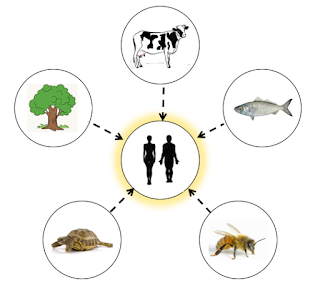Framing for care and engagement (Part II): What is a frame?
A lilac-breasted roller (Coracias caudatus). Photo by Sander Wehkamp on Unsplash
By Rodrigo Cáceres
In the first part of this post, we talked about the recent international consensus from governments and expert scientists (i.e. IPBES) stating that "current trajectories" (including "economic, social, political and technological factors") are incapable of coexisting in harmony with life on Earth. We were also able to reveal potentially transformative narratives such as "Reconciling with life" or "Reconciling with nature", that embody an active and loving engagement towards the defense of life on Earth.
The main point that I've been trying to make in these essays is that the way we talk about life on Earth deeply matters and that there are profound differences between distinct ways of speaking about life on Earth. Naturally, this is not just something that I claim on my own; it is one of the main lessons from the field of cognitive linguistics (Croft & Cruse, 2004) and contemporary theory of metaphor (Lakoff, 1993, 2010). These scientific fields have proved that language shapes the way we think and behave in the world. They've also found out that we think within frames. A frame can be defined as "an unconscious ideological structure, a system of words/concepts that relate and co-constitute meaning between each other and, as a whole, they enact a certain symbolic reality."
(Symbolic reality is also referred to as ontology in recent works in anthropology, mainly by Philippe Descola and Arturo Escobar).
(Symbolic reality is also referred to as ontology in recent works in anthropology, mainly by Philippe Descola and Arturo Escobar).
To help you get a good picture of what this means, let's look at the frame "Nature is a collection of resources" (Gudynas, 2010). This frame is characterized by several words and concepts that are closely connected to each other. These words and concepts are: natural resources, exploit, exploitation, overexploitation, stock, abundance, scarcity, extract, extraction, extractive industry, extractive economy, development, develop, consume, consumption, deplete, depletion, use, overuse, manage, management.
As you might anticipate, this frame creates a vision where nature (life on Earth) is to be treated as an object towards which we have a relationship of exploitation and instrumental use and consumption, and towards which we should think only in terms of material quantities (abundant, scarce, depleted). In this manner, what is automatically left out of this frame is all the sensorial, emotional and aesthetic relationships we might have towards nature (life on Earth), at the same time as it completely rules out a vision of living beings as conscious, autonomous and intentional subjects.
In this way, when the frame "Nature is a collection of resources" is activated in the minds of people, a lot of things can happen in the world: you can justify the existence of mega-industrial projects; mountains and valleys can be blown up by the name of "mountaintop removal mining"; forests can be wiped out in the name of palm oil development, among many other practices of "extraction".
Mountaintop Removal Mining in Kentucky, US. Photo by Doc Searls, licensed under CC BY 2.0
As you might be aware, the frame of "Nature is a collection of resources" is an incredibly popular frame and it is used all the time in politics and public administration; by corporations and even environmental NGO's. Moreover, this frame is foundational for mainstream economic theory that is currently taught in most faculties in economics around the globe. Talking about nature in terms of exploiting natural resources has become so naturalized in modern cultures that nowadays it seems like "common sense".
However, we should definitely understand that this particular frame, as well as all frames in general, have the following features:
However, we should definitely understand that this particular frame, as well as all frames in general, have the following features:
- Frames have a political nature and political consequences. For example, the fact of treating animals, plants and the land as objects to be exploited implies that those beings do not have the right to exist, that their sentience is not recognized and that they are forever excluded from the political domain.
- Frames are never neutral in values. This is a consequence of the preceding affirmation.
- Frames are enacted. Frames get materialized in concrete practices that design a particular world and enact its respective meaning system.
- Frames can only be judged in terms of values.
- Frames create meaning. For example, the practice of creating a mega-industrial project has meaning (it makes sense) only within the frame of "Nature is a collection of resources". Alternatively, within a frame such as "Nature is mother", a mega-industrial project belongs to the domain of absurdity, a disrespectful and disloyal practice opposed to reason and understanding; it does not make any sense.
References
Croft, W., & Cruse, D. A. (2004). Cognitive linguistics. Cambridge University Press.
Gudynas, E. (2010). Imágenes, ideas y conceptos sobre la naturaleza en América Latina. Cultura y naturaleza, 267-292.
Lakoff, G. (1993). The contemporary theory of metaphor.
Lakoff, G. (2010). Why it matters how we frame the environment. Environmental Communication, 4(1), 70-81.
Gudynas, E. (2010). Imágenes, ideas y conceptos sobre la naturaleza en América Latina. Cultura y naturaleza, 267-292.
Lakoff, G. (1993). The contemporary theory of metaphor.
Lakoff, G. (2010). Why it matters how we frame the environment. Environmental Communication, 4(1), 70-81.






Comments
Post a Comment